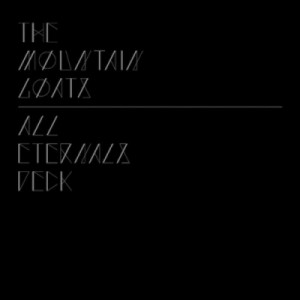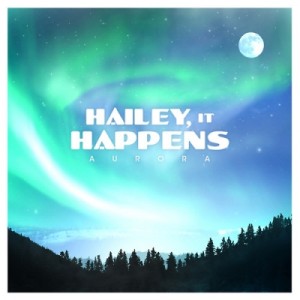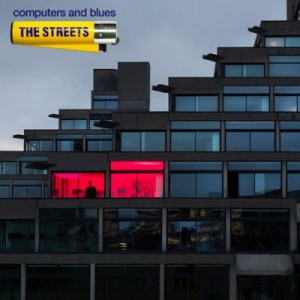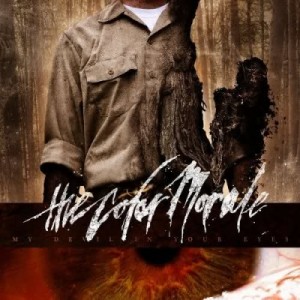Reviews
Review: The Mountain Goats – All Eternals Deck
The Mountain Goats – All Eternals Deck
Release Date: March 29, 2011
Label: Merge Records
Purchase: iTunes | Insound | Amazon
As any seasoned fan of The Mountain Goats (or “Old Goats” as they are so want to be called) will tell you, the group has always been little more than a creative vehicle for frontman John Darnielle. Diminutive and seemingly painfully suburban, he imbues his nuanced lyrics with such an unrefined emotional rawness that Mountain Goats classics like “No Children” and “Dance Music”– apotheoses on love, loss and dysfunctional relationships – manage to be in equal parts deeply personal and arrestingly touching.
By this measure, All Eternals Deck is a starkly underwhelming album. Lyrically, the album seems strained – Darnielle’s once effortlessly sinuous song writing is mired in a slew of simplistic “night/light” ABCB couplets, an unfortunate album trait exemplified in the utterly forgettable “Prowl Great Cain”. This percussion-driven romp, with its clichéd biblical reference and contrived end rhymes, is an insipidly glib experience that is regrettably mirrored in many of All Eternals Deck‘s tracks. The album is thematically unfocused as well – the record opens with an angry meditation on the meaning of freedom (“Damn These Vampires”), diverts itself briefly into an ode to love lost (“Age of Kings”) and finally arrives at a self-depreciating criticism of big-city life (“Liza Forever Minelli”). The only connecting aspect throughout the album is a pervasive sense of dread – when he’s on form, even on musically upbeat tracks (“High Hawk Season”), Darnielle’s interminably candid vocals saturate the record with malaise and foreboding.
Where the album truly comes into its own is within the function it serves for the rest of the band’s catalogue: All Eternals Deck marks the final stage of the Goats’ progression from Darnielle’s early hushed acoustic work to what is essentially an exercise in vaguely The Hold Steady-esque alt-rock. This is arguably the most obviously produced of the Mountain Goat’s albums, lending inarguably from the involvement of legendary death metal producer Erik Rutan, however the value of his influence on the record is debatable. Darnielle traditionalists will likely resent the unapologetically more accessible direction taken on the album whilst new fans will appreciate its cleanliness. Personal preference notwithstanding, the fact remains that on at least several of the tracks Darnielle’s vocals have had their sincerity buffed out by over-zealous production – gone are the idiosyncratic inflections and intimately delicate intakes of air at the end of lines that shone so clearly in past albums (Read: The Life of the World To Come). The vocal track that remains is often embarrassingly reedy and unimpressive, especially on the tracks in which Darnielle attempts to raise his voice above his typical reserved lilt and into a stirring bellow (“Birth of Serpents”). Significantly, there is an obvious decentralization of Darnielle as the creative driving force of the band – there is a much more diverse instrumental track in the album compared to some of its acoustic guitar-lead predecessors, telling of a more involved contribution from bassist Peter Hughes and drummer Jon Wurster.
All Eternals Deck is by no means a bad album. The lyrics may not be Darnielle’s finest, but at the same time he abstains from counting off the days of the week – he is as always at the head of his contemporaries in this regard. As a typical Mountain Goats record, it takes no excessive risks but is appropriately emotive and sublimely executed. Ultimately, listener enjoyment of this album is largely dependent on their opinion of the band’s back catalogue: an All Hail West Texas purist can be expected to disapprove of the relatively weak writing and intimacy of the record. All Eternals Deck has only promising things to say about the future of The Mountain Goats, and knowing John Darnielle – we won’t have to wait long till we find out just what it entails.
6.1
Standout Track: “Never Quite Free” – triumphantly defiant, a fitting emotional climax for the album.
Track: Emery – “Scissors”
Track: “Scissors”
Artist: Emery
Release Date: January 26, 2011
Label: Tooth & Nail Records/Solid State Records
Although post-hardcore band Emery released a preview clip of “Scissors” back in January when they announced the release of their fifth album We Do What We Want, the entire track is worth a listen. We Do What We Want was released on March 29th and is noted for being their heaviest album yet, but Devin Shelton’s melodic vocals keep Emery’s sound to what listeners have always appreciated. The first nine seconds of the track could fool listeners, because right away, it appears that the entire track could be covered in screams and double-bass hits, but then Shelton’s voice takes over, delivering passionate lyrics that shine the whole way through, especially during the build-up to the breakdown. “Hands held towards the sky in the cool air of October, the whispers were always there, but they never caught up to your words, so will December find me all alone,” sets up an ending to “Scissors” that closes as hard as the track begins.
“Scissors” is from We Do What We Want, out now via Tooth & Nail Records and Solid State Records.
Listen: Via Emery’s Myspace
Rating: 7.5/10
Review: Toro Y Moi – Underneath the Pine
Toro Y Moi – Underneath the Pine
Released: February 22, 2011
Label: Carpark Records
Purchase: iTunes | Insound | Amazon
Lovely album art, isn’t it? They say that one should never judge a book by its cover, and while it wouldn’t be entirely correct to dismiss Toro Y Moi’s Underneath the Pine on its cover alone, it is actually nice visual representation for the music: dated, a failed attempt at artistry, and generally ugly.
Quickly opening the case and popping in the CD (or eschewing the visual assault altogether with a digital copy), the listener is greeted with the aptly titled intro, “Intro/Chi Chi”. The opening fuzzy synthesizers are nearly as hideous as the album art, but after a minute, drums and bass reminiscent of Twin Shadow kick in, providing some hope for what lies ahead. Unfortunately, despite a few bright spots, much of this hope is in vain.
Pine is very much an acquired taste, and unless one already has an affinity for the muddled, retro sound that Chazwick Bundick, the man behind it all, is trying to convey, there isn’t much to like. It isn’t that he can’t write music; his creative decisions are very intentional and have a particular audience, but the end result will likely sound off to the average listener.
Much of the blame for this sound lies in two sources: the vocals and the synths. Bundick’s high pitched vocals, while unique, have an airiness that makes him sound in near-perpetual falsetto. Needless to say, this only has a limited amount of utility. Instead of clearly defined vocal lines, the singing occasionally comes off more as an off-putting, calculated series of moans (see “Before I’m Done” or “Good Hold”). As mentioned above, there is obviously a stylistic method to his madness, but that doesn’t make the result any less mad.
The biggest problem with the synths isn’t excess, but irresponsibility. Many songs contain background synths which don’t serve much purpose but to outline the current chord. However, in most cases in which they are used, the distortion gives them a very dreary sound, which, combined with the vocals, often drags the entire song down. While it is usually just a case of sounding generally muddy, the background instrument in “Good Hold,” actually a piano in this case, just plays terrible notes that don’t blend with the sound at all.
All of that being said, however, there are a few good songs on the album, and that’s not even a qualified statement of “good compared to the rest of the album.” It is no coincidence that these songs happen to be the singles, the songs that are naturally going to be most accessible. “New Beat” is fairly infectious, vocal weakness aside, with a synth line seemingly torn straight from a Sega Genesis. “Got Blinded” is a fun, vaguely 60s song with wonderfully layered synths, piano, and bass, and a rarity on the album, it even has a memorable chorus. “Still Sound” starts with a strong bass line and three well-blended synths, and the bouncing singing actually has personality. These are fun, memorable songs that are likely the only to warrant repeat listens.
The rest of the songs never seem to rise above the hindering synths and vocals. There are rarely moments that even stick out and make the song overcome the mire of mediocrity. In fact, individual moments in the song may even make things worse. “Good Hold” (notice how many times this song has been negatively mentioned?) may perhaps be most notable for its extreme shift of all sound to the left speaker, which I personally found physically uncomfortable in headphones.
Not even the lyrics can save the songs. Not only are they often drowned out by the music, they are difficult to understand, again due to the vocals. Those that I could make out, with the exception of “Still Sound,” rarely rose above the simple level of typical relationship songs.
I rarely say this when listening to music, but Pine is a largely unpleasant experience. It’s hard to define exactly, but it feels like in some sense, it just lacks “music.” While I normally write it off as not my taste, I can see few people actually getting into this music, with the exception of the singles. Too much of it sounds dreary without justification, and listening to it simply becomes a drag. Bundick clearly put effort into his music, but it nonetheless has very limited appeal.
5.5
Standout Tracks: “New Beat”, “Got Blinded”, and “Still Sound”
Review: Hailey, It Happens – Aurora
Hailey, It Happens – Aurora
Released: April 5, 2011
Label: Self-released
Purchase: iTunes | Amazon
Some of the best things in life just happen – you stumble upon them unknowingly, with absolutely no idea how important they will be to you in the future. But later, after the fact, everything sinks in and the waves of emotion hit. At this point in time, a personal importance is assigned and we’re left clutching at thin wisps of memories. These are the moments when we realize just how lucky we are and what we have run into. Things happen.
Life happens. The other day I stumbled upon electronic pop duo Hailey, It Happens and, for better or for worse, decided to give their debut album a listen. Now, after the fact, I’m certainly glad I did. Their debut albumAurora is pop in the vein of Owl City and Ben Gibbard’s The Postal Service fused with the songwriting talents of Andrew McMahon (Jack’s Mannequin and Something Corporate). Picture a less poppy, more capable Owl City and you have Hailey, It Happens.
“I Gave Her My Heart, She Gave Me a Pen” opens the album with a combination of drums, piano, and synth. Vocalist Chris Cleary’s superb range is highlighted through the chorus – the noticeably high quality mixing by Paul Levitt complements the band’s sound quite nicely, allowing Chris’s voice to really shine. His honest and endearing delivery takes center stage on Aurora. On “Invincible”, Cleary sings, “…and this is where I spent my nights with the king of pop and the piano man”, a warm memory that should be easy for many to relate to.
Holistically speaking, the overall sound of Aurora could be characterized by the natural phenomena itself. The album includes numerous breath-taking moments of sonic brilliance – the music is fun, catchy, and poppy enough to hook you in, but once you’ve been pulled in, the honest, passionate lyrics keep you around for more.
But that isn’t where Aurora shines brightest – the intricacies of the album are what really make it great. It might be a backing synth line from Bobby DiBari on one track or an echoed “woah” on another, but on each song, there’s something unique and inherently beautiful hidden underneath the basic makeup of their music. This is what makes Aurora so good.
Aurora isn’t without its flaws, though, as the duo provide very little variety throughout the course of the eight-track album. For the most part, the songs are all pretty similar sounding with similar song structure and composition. Closing track “Hurricane” is a bit more toned down and is certainly more reserved than the rest of the album, ending the album on a different (and welcomed!) note.
Great things may in fact be better when they are least expected. Things happen. Life happens. I may not know who Hailey is, but Hailey, it happens. Life happens. We’re all just here for the ride.
8.4
Standout Tracks: “Brighter”, “Aurora”, and “Hurricane”
Review: The Streets – Computers and Blues
The Streets – Computers and Blues
Released: February 22 (Europe), March 29 (U.S.)
Label: Warner Bros. UK
Purchase: iTunes | Insound | Amazon
Mike Skinner, rap name The Streets, faced a musical dilemma, but eventually came out on top. His first two albums were quite successful and nearly universally acclaimed. Unfortunately, both of them were about the common experiences in the life of a regular person. With such popularity, one can hardly harvest lyrical material from the same source for later albums.
As such, the two albums that followed didn’t have nearly the impact or the reception that his previous work did. His latest and final album, Computers and Blues, seeks to buck the trend and strike a balance between the two sides of Mike Skinner. All in all, it boils down to his best album in years.
The signature elements of The Streets make a return: the intentionally unpolished laptop-produced music, the unhurried, off-beat rapping, and of course Mike Skinner’s Mockney accent. This time around, he takes his computer beats to a whole new level, incorporating many sounds from the 8-bit era.
This is demonstrated by the opening to “Outside Inside”. The Nintendo-era sounds promptly give way to a Spanish guitar backing the first verse, which sounds odd and hollow until a techno bass fades in beneath it, rendering a sense of completion to the beat. Lyrically, it doesn’t have the deepest content, but a song about getting high does hearken back to the themes that made him popular to begin with, so it does provide a hopeful start.
Unfortunately, the next song is the biggest letdown on the album. “Going through Hell”, has music that just never works for the song, and the lyrics, while meant to be inspiring, come off more as the faux philosophy of his previous album, Everything is Borrowed.
This is deftly overcome by the wondrous “Puzzled by People”. In addition to boasting great beats and some entertaining and clever crossword-based lyrics (“I’m 2 down and you’re 1 across the room/Beginning with I and ending in U/Beginning in my I and ending as an X”), the song hits deep. One can empathize with the feeling of not understanding others, and the simple way he finds meaning in this puzzle is touching.
Skinner implements similar wordplay later on the album in the song “ABC”, in which he attempts to use every letter in sequence as a word, though in that case, it is more of a fun diversion than a serious song.
Compared to his past two albums, Computers and Blues is more personal on the whole. “Blip on a Screen” strays into new territory for Skinner, with him singing to his unborn child. “We Can Never Be Friends” is a break up song that stands up well next to his past hit “Dry Your Eyes”. “Trust Me” is a short and sweet song with nice beats and a simple message of unity. The last track, “Lock the Locks”, an ambient song about leaving his life behind, is a perfectly fitting final bow to his career.
Skinner isn’t completely free from his Everything is Borrowed philosophical musings, however. There are a few forgettable songs such as “Those That Don’t Know”, the hiccupping “Soldier”, and “Trying to Kill Me”, one of the only songs that breaks his usually effortless and impressive flow.
Given the turn of his career, some breathed a sigh of relief when Skinner announced that Computer and Blueswould be the last album by The Streets. Many would rather that he end with mediocrity than continue on a downward path for years. Computers and Blues defies expectations, however, and proves to be a competent end to his career. It doesn’t quite reclaim his former glory, but it’s a good note to leave on.
7.7
Standout Tracks: “Puzzled by People”, “Blip on a Screen”, and “We Can Never Be Friends”
Single: Explosions in the Sky – “Trembling Hands”
Track: Trembling Hands
Artist: Explosions in the Sky
Release Date: March 8, 2011
Label: Temporary Residence Limited
Four years after the Texas-based post-rock band Explosions in the Sky released All of a Sudden I Miss Everyone, they have finally released a new song. “Trembling Hands” is the first official single off of Take Care, Take Care, Take Care, the band’s sixth official studio album. If you’re already familiar with the band’s old music, you will know that this song is much different from their past work. First off, this song is no more than four minutes long, which is fitting for a single, but odd for an Explosions in the Sky song. Also, instead of having a long, monumental build-up, the song immediately starts out upbeat, with the drums kicking in from the beginning. Another thing to note is that this song has very faint, but distinguishable vocals. However, this song still has what Explosions in the Sky fans have been craving for for years: vibrant guitar riffs and ornate soundscapes. “Trembling Hands” is an energetic song which shows that the band has definitely changed their overall sound over the years. This song could be a good example of what the new album will sound like, but is it for the better? That’s for you to decide.
If you haven’t heard the song yet, you can download it here for free or below.
Rating: 8.5/10
Track: Frank Ocean – “Novacane”
Track: “Novacane”
Artist: Frank Ocean
Release Date: February 18, 2011
Label: Self-released
Contrary to what you may have heard, hip-hop collective OFWGKTA are an incredibly diverse group of musicians. The debut release from Odd Future’s Frank Ocean, titled Nostalgia, Ultra., makes this point undeniable; Frank Ocean’s music centers on his smooth, groovy vocals instead of rapping like the rest of the crew. “Novacane”, a standout from the incredibly ambitious self-released record, features Frank Ocean wearing his heart on his sleeve, spinning a tale of his confusion and frustration with a woman aspiring to become a dentist; hence the title of the song and chorus lines “Novacane, numb the pain.” Pitchfork compares his loverboy, R&B persona to that of Drake – Frank Ocean is raw, honest, and can sing his heart out. Stripped down to the core, the youthful spirit and self-confident “swag” of Frank Ocean embody everything that Odd Future represents, even if the music is noticeably different.
“Novacane” is from Nostalgia, Ultra. out now. You can download it for free here.
Rating: 9/10
Review: Valencia – Dancing With a Ghost
Valencia – Dancing With a Ghost
Released: October 12, 2010
Label: I Surrender Records
Purchase: iTunes | Amazon
Every night, as we are about to lazily drift off to a wonderful place known as sleep, most of us go into a deep state of thinking. Whether it be about what we’re going to do the next day, a contemplation of life, or just why our room smells so bad, we all think about something leading up to that glorious state of unconsciousness. These things may or may not affect the way that we dream. Dreams can be anything from happy, to dark, to just bizarre (or all of the above!) and as we listen through the third album by the five-piece alternative/pop-punk group, Valencia, titled Dancing With a Ghost, it can somewhat be comparative to the different stages and/or types of dreaming.
As the album opens with the light, poppy guitars and sing-along vocals leading into the first few tracks, we are submerged in a blissful state of a fun and happy dreaming (“Dancing With a Ghost” and “Still Need You Around”). As frontman Shane Henderson sings along to the spirited guitar riffs of Brendan Walter, JD Perry, and George Ciukurescu and the delicate drums of Daniel Pawlovich, Henderson remits an uplifting message. We, as the listeners, will find ourselves floating along jubilantly through the sunny dream world, not a care in the world.
But as we are all familiar with, dreams aren’t always such a playful environment and constantly change as we sleep so soundly in our beds. As Dancing goes on, our sunny dream world slowly shifts to a bit more serious atmosphere as we slowly realize that everything is not as happy as we originally had thought (“Consider Me Dead” and “Losing Sleep”). The scenery changes to a still pleasant, but slightly bizarre world. As Henderson exclaims “Give me the chance to speak my mind/My opinions are the social kind/If it’s you for you and I for I/Then one of us will leave here blind/You know I won’t give up without a fight/Even if I’m the one who’s wrong and you’re who’s right” leading the way accompanied by spacey guitars, troubles begin to surmount in the dream, setting the stage for an unwanted antagonist to arrive.
Then, suddenly, the effervescent world is crudely interrupted entirely by the deeper problems hidden in our subconscious and the dream becomes a dark, perplexing place; the previously whimsical feeling is almost entirely gone, replaced with a worried uncertainty as the music becomes increasingly frantic in our minds (“Friday Night”). Storms sweep in in the form of sadistic guitar tones and dark lyrics (“When desperate we collide and disappear in fear/We’ve been living in a dream/Selfishly, I try to blur the lines that hide that I/I guess I fucked up/I guess I was wrong”), and pounding drums coupled with the thunder of the guitars begin to interfere with the previously bright sunlight that was shining so beautifully and as suddenly as the storms had appeared, they subside.
We are now left feeling lost, and somewhat alone (“Somewhere I Belong”). The words “My life has always been a dead end street/with heavy eyes that shoot through me/I slipped somewhere in between what’s right and wrong” ring through the light gray clouds backed by an arrangement of strings, and we start to question what just happened, why it happened, and if things will go back to the way they were before. But at this point, we can’t even remember what was so happy about the dream in the first place. Perplexity sets in once again, and we begin to question whether our dream is reality or in fact a dream. The pace of the music begins to increase and this state of confusion leaves us in a very odd, yet somehow pleasing mood as delightful guitar-work reveals a certain hope as they back the worried lyrics (“Days Go By” and “The Way”).
Abruptly the dream changes once again. Making a quick transition from spaciness and confusion, to a more familiar pop-punk driven urgency, we finally realize what we have to do to get back to the once-happy world that is slowly fading from our memories (“Stop Searching”). As we come to a certain light, the dream starts collapsing around us as we begin to finally awaken. We know what we want, but everything is becoming so blurred around us, and as our happy place is nearly in reach once again, the dream ends. We are awake with nothing but a vague memory of a long journey of happiness, struggle, and emotion that we long to see again. Luckily, in the case of Dancing With a Ghost, we can revisit this dream whenever we please, and admire its brilliance and intricacy with the same enjoyment each and every time.
8.5
Standout Tracks: “The Way,” “Friday Night,” “Losing Sleep”
Review: Cut Copy – Zonoscope
Cut Copy – Zonoscope
Released: February 15, 2011
Label: Modular Fontana
Purchase: iTunes | Insound | Amazon
Daft Punk recently rocked movie theaters and headphones with their soundtrack to Tron: Legacy, but there hasn’t been much to keep the dance going since then. Listeners in this plight need only to take a gander at Australia’s Cut Copy for their next dance-rock fix. Their third album, Zonoscope, was released February 15, and when it shines, it shines brightly.
The party starts with the techno opening to “Need You Now”, building up and adding layers of sound until Dan Whitford’s vocals kick in. Though initially slightly off-putting, in this song, he displays a decent range and contributes his own unique part up to the climactic ending. It is a great way to open the album and a display of Cut Copy playing to their strengths.
These strengths shine through for much of the first half of Zonoscope. “Pharoahs & Pyramids” begins with an intriguing synth intro to build anticipation. Slowly, more instruments and layers are added, creating a richly textured musical landscape. As the music swells, it suddenly gives way to a fun, syncopated bridge, eventually erupting into dance nirvana.
“Blink and You’ll Miss a Revolution” is full of musical mischief, with wooden blocks belying the initial bass groove. As the song continues, though, the music evolves, not only by adding more layers, but by changing the placement and instrumentation of these starting musical lines. By the time the slower instrumental “Strange Nostalgia for the Future” kicks in, it is a much-deserved break from the energy-infused first half.
Unfortunately, it is also at this point that the fun begins to wane, as the album is rather front-heavy. Listeners may float along with the stripped down “This is All We’ve Got,” but for the most part, it is a forgettable journey. The same can be said of the overly-long “Hanging Onto Every Heartbeat.”
“Alisa” boasts some delightful synths in the intro and pre-chorus, but these give way to a more basic guitar and drums combination. The song isn’t bad, and the chorus has a definite energy, but it lacks the spark of earlier tracks.
The party eventually recovers with “Corner in the Sky,” a wonderfully ambient number. Bolstered by a deep, techno bass, a great pre-chorus synth line, and the explosive chorus, it brings the sound full circle and paves the way for closer “Sun God”. While not a great song, especially vocally and lyrically, it does a good job with winding down for the night, though it does border on the excessive with ten minutes of closing instrumentals.
Cut Copy have definite skills in their musicianship, and their most consistent weakness lies in the vocals and lyrics. Most of the time, Whitford’s voice lacks passion and he slurs his words. It serves a purpose as another instrument to add to the texture, but little more.
The same can be said of the lyrics, which, with the exception of “Corner of the Sky”, rarely rise above a surface depth. This is much more acceptable though, as the words don’t really matter with music so rich.
Zonoscope is exceptional when it plays to Cut Copy’s strengths, but falters when it strays from them. Even so, the excellent highs far outweigh the forgettable, skippable lows. They are talented musicians, but they should stick to what they know best in the future.
7.6
Standout Tracks: “Need You Now”, “Pharoahs & Pyramids”, and “Corner of the Sky”








Connect